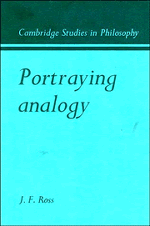Book contents
- Frontmatter
- Contents
- Dedication
- Preface
- Introduction
- 1 The limitations of classical analogy theory and the Miller's Analogies transition
- 2 The genus: meaning differentiation
- 3 Predicate schemes: an explanatory model
- 4 Equivocation, analogy and metaphor
- 5 Denominative analogy and paronymy
- 6 Figurative discourse
- 7 Analogy and religious discourse: craftbound discourse
- 8 Analogy and analysis
- Notes
- Bibliography
- Name index
- Subject index
8 - Analogy and analysis
Published online by Cambridge University Press: 07 October 2011
- Frontmatter
- Contents
- Dedication
- Preface
- Introduction
- 1 The limitations of classical analogy theory and the Miller's Analogies transition
- 2 The genus: meaning differentiation
- 3 Predicate schemes: an explanatory model
- 4 Equivocation, analogy and metaphor
- 5 Denominative analogy and paronymy
- 6 Figurative discourse
- 7 Analogy and religious discourse: craftbound discourse
- 8 Analogy and analysis
- Notes
- Bibliography
- Name index
- Subject index
Summary
Most philosophers think truth-conditional analysis tends to fail. From the paradigm itself, the Russellian contextual analysis of ‘The author of Waverly was Scott’ that treated ordinary proper names as definite descriptions, through Ayer's criteria of meaningfulness and verifiability, Lewis' analyses of modes of meaning, Hart's model definition for jurisprudence, Grice's analysis of speaker meaning, Hempel's analysis of explanation and Chisholm's (1966) analyses of knowledge, truth-conditional analyses founder on counterexamples and, when repaired, typically show more anomalies than did the originals. Besides, analyses that set out to clarify often become so complex (Schiffer 1972: 165; cf. Coady 1976: 102–9), abstract or artificial that they cannot convince. For example, Goodman's analysis of musical notation (1968:177–92); Field's (1978) and Fodor's (1975) account of beliefs as ‘language-like internal representations’ that are, or correspond to, ‘sentences or sentence analogues’. See also Harman (1974b: 57). Is the fault in our performance or in our expectations?
Truth-conditional analysis is misunderstood. Attention to the analogy phenomena will correct some misconceptions. Others persist from confusions about the inter-relationships of sentences, statements, propositions and truth conditions, from confusions about the notion of same logical form and from unrealistic expectations about what is to be accomplished by analysis. I touch incidentally on the latter matters but my main interest is in showing how analogy and equivocation place constraints upon the process of analysis.
I conclude that truth-conditional analysis is an articulation device, instrumental to encompassing strategies (like explanation, conceptual realignment, auditing a reasoning process, hypothesis establishment or rejection), that determine the units of appropriate logical and conceptual decomposition.
- Type
- Chapter
- Information
- Portraying Analogy , pp. 179 - 211Publisher: Cambridge University PressPrint publication year: 1982

